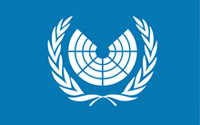Now that there are meaningful institutions of global governance – the United Nations, the World Trade Organisation, and many others – the principles of democracy and accountability demand that there should be a parliamentary assembly to hold those institutions to account. They should not escape public and political scrutiny on the grounds that they are international organisations: such a status makes it more important that they are accountable, not less.
Read more on this website about the idea of a global parliamentary assembly here.
¤ ¤ ¤

A United Nations Parliamentary Assembly (UNPA) for the first time would give citizen representatives, not only states, a direct and influential role in global policy. The assembly would not replace existing UN bodies but would be an additional means to integrate parliamentarians more effectively into the shaping of globalisation.
As a transitional step until direct elections become practical, the UN Parliamentary Assembly could consist of delegates from national and possibly regional parliaments, reflecting their political diversity. The UNPA would therefore include members of minority parties whose opinions are often not represented in the United Nations. Unlike current UN ambassadors, UNPA representatives would not be subject to the authority of national governments. These parliamentarians would be free to ask probing questions, raise sensitive issues, and table innovative proposals for consideration by the Security Council, the General Assembly, the Bretton Woods financial institutions and other UN bodies.
The great problems of our times – such as war, disease, poverty and climate change – cannot be solved by individual nations acting alone. Direct citizen representation could help the world develop a greater understanding of itself as a global community. At the highest levels of the United Nations, a UNPA could function as a world conscience and watchdog, and a catalyst for further reforms. Over time, the UNPA could evolve from a consultative body to a world parliament with genuine rights of information, participation and control.
A consultative Parliamentary Assembly at the UN could be established as a subsidiary body by a vote in the General Assembly under Article 22, without changing the UN Charter. The historical record demonstrates, as with the Land Mines Treaty and the International Criminal Court, that if a few countries urged on by civil society take the lead, significant transformation at the international level is indeed possible.
The “Appeal for the Establishment for a Parliamentary Assembly at the United Nations” promoted by the UNPA-Campaign reflects the consensus among like-minded parliamentarians, civil society representatives, activists and scholars regarding the proposal.
Visit the website of the Campaign for a United Nations Parliamentary Assembly here.
